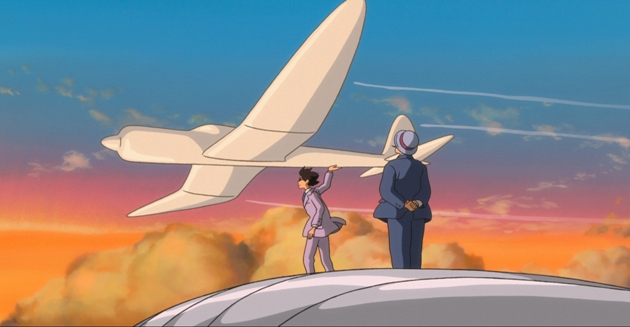 This review contains spoilers for The Wind Rises.
This review contains spoilers for The Wind Rises.
Le vent se lève, il faut tenter de vivre.
So goes the repeated refrain of The Wind Rises, the apparent swansong of legendary animator Hayao Miyazaki. It means ‘the wind rises, we must try to live,’ and it is a phrase that characterises the whole film, as the central character, Jiro, works out how live. His life is marked by a series of wind-moments, each signifying a change or progression of this journey to understanding life: a hat blows off his head as he meets his future wife for the first time, a scene echoed later on by a parasol similarly taking flight; a prototype of the plane he will build soars past him as he rides a luxury cruiser in one of the film’s many dream sequences. Wind, to Jiro, is change, ambition and the future. The wind is rising, now he must learn how to live. Yet the tension between the two principal influences in his life – his job as an aircraft engineer and his relationship with Naoko – is one that is never fully resolved, and ultimately both his planes and his wife leave without ever returning, to live on only in his dreams.
A melancholic note, then, for the final film by one of cinema’s greatest artists, and one senses a certain glum reflection in Miyazaki’s writing as he looks back and sees whether his work has been worth anything. What has he lived for? While there is a strain of pessimism that runs throughout, the film itself is a testament to the fact that the director’s name and work will live on long after he has hung up his paintbrush. As with 2014’s other airborne masterpiece, How To Train Your Dragon 2, The Wind Rises showcases animation’s capacity to capture the joy and unrestrained freedom of flight. It is a film of dreams, where imagination can cause you to soar across beautiful landscapes and rise to heights hitherto unseen. It goes without saying that the animation on display is absolutely stunning, but in making a film that is more complex and subtle than some of his more famous films, The Wind Rises is also profound and intelligent, and not immediately accessible to those whose only experience of the master is his last film, Ponyo. For those with patience, however, the result is remarkable and rewarding.
The Wind Rises may be an adult, somewhat downbeat note to end an illustrious career on, but it is also one of breathtaking beauty and hidden depth. Miyazaki, like Jiro, has honed his craft to perfection, but unlike the zero fighters that never returned, the great mind behind Totoro and Spirited Away has left a legacy that will live on a long time.




